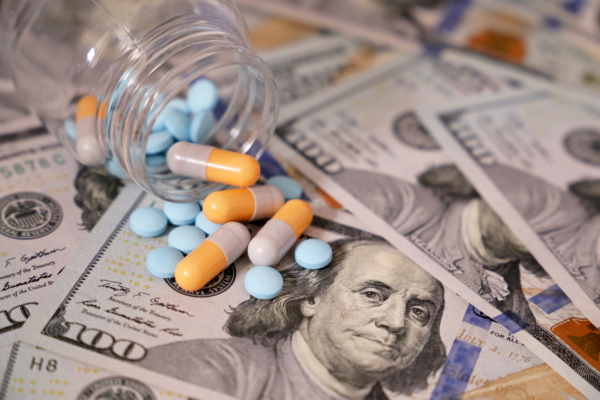
Big Pharma is none too happy with legislation to allow Medicare to negotiate drug prices, according to published accounts and members of the advocacy community. Such opposition is nothing new, of course, but it has intensified as the Democrats’ (and the President’s) drug reform plans work their way through Congress as part of the budget reconciliation process.
Of course, the drug industry fears that allowing Medicare to negotiate drug prices would cut into its sizeable profits.
“Big Pharma — one of the most profitable industries in America — is absolutely horrified at the idea that its ability to extract all those trillions of dollars might be limited.” – Washington Post, 8/27/21
Currently, Big Pharma can set prices at will – no matter how outrageous or unaffordable. (Simply look at the skyrocketing price of insulin, for example.) Medicare negotiation would force the industry to the bargaining table with the federal government – saving some $456 billion in drug costs over ten years. But price negotiation was specifically excluded from legislation creating the Medicare Part D Prescription drug benefit in 2003, at the industry’s behest.
Meanwhile, overwhelming majorities of Americans from both parties support this commonsense proposal in poll after poll. But Big Pharma is running an expensive ad campaign to scare the public. One television ad warns about “Pelosi’s socialist drug plan.” Another features a senior with diabetes named “Sue” who claims that price negotiation “would make it harder for people on Medicare to get the medicines we need.” No, actually, it’s the high cost of insulin and other essential drugs that make it harder for people on Medicare to get the medicines they need. Too many beneficiaries simply can’t afford their medications — and cut pills in half or skip filling prescriptions altogether.
The pharmaceutical lobby warns that “Washington (would) control the prescription drug market” through price negotiation. If that were true, then the Veterans Administration would already be controlling the market, because it has been negotiating drug prices with Big Pharma for years. The federal government constantly negotiates prices for private sector services and products. It’s part of the free-market system that conservatives tout. Does that mean Washington ‘controls’ the market for everything from concrete to aircraft? Obviously not. In fact, we are the only Western industrialized democracy that does not negotiate prescription drug prices with manufacturers – or have an agreed upon pricing structure.
“American drug purchasers pay substantially higher prices for drugs than their counterparts in other developed countries. A recent paper from the RAND Corporation cited in the government proposal estimates that prescription drugs in the United States cost more than 250 percent of the prices paid by other countries.” – New York Times, 9/9/21
Big Pharma insists that price negotiation would stifle innovation in the pharmaceutical market, even though the federal government puts significant resources into research on new drugs. (In fact, the federal government was instrumental in developing the mRNA technology used in the Moderna and Pfizer vaccines.)
“A study underwritten by the National Biomedical Research Foundation, mapped the relationship between NIH-funded research and every new drug approved by the FDA between 2010 and 2016. The authors found that each of the 210 medicines approved for market came out of research supported by the NIH. Of the $100 billion it spent nationally during this period, more than half of it — $64 billion — ended up helping the development of 84 first-in-class drugs.” – Other98.com
Medicare price negotiation is one facet of the Democrats’ proposed drug reforms, along with lower out-of-pocket caps for beneficiaries and tying the increase of prices to inflation. Advocates consider negotiation the most potent tool for bringing down seniors’ drug costs. But the measure must survive the reconciliation process in the Senate, where the Democrats need fifty votes to enact reform. Seventy-two U.S. Senators received contributions from Big Pharma in the last election cycle. That is not to say that some Senators won’t do the right thing, but the sway of drug industry dollars can be powerful.
In the end, lawmakers’ priority should be the people on fixed incomes who can’t afford their medications, the Americans who have died from rationing medicines, the retirees forced to choose between groceries and prescription drugs because of cost. They are the ones who badly need relief. Drug manufacturers will be perfectly fine — even if the price negotiation they dread is finally enacted.


